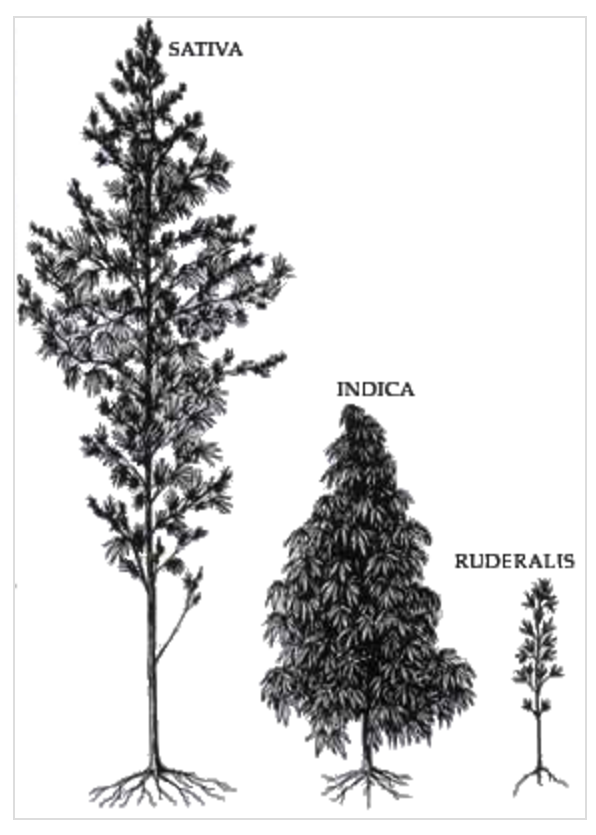
Cannabis Varieties
Cannabis Indica and Cannabis Sativa are the two main varieties of the cannabis plant used as medicine. There are many original landrace genetics of both varieties that come from many parts of the world. Within each of those varieties there are a huge number of individual strains, each with a different cannabinoid profile and medicinal effect.
As Indica strains have more chlorophyll than Sativa strains they grow and mature faster. Cross breeding Indicas with Sativas or a combination thereof creates hybrids. The resulting hybrid strains will grow, mature and differ medically in relationship to the indica/sativa percentages each phenotype contains.
The benefit of hybridization is that the breeder can attempt to create strains that are profiled to grower and patient needs. In today’s market hybrid strains dominate the market, as most strains have been crossed at one time or another.
Pure Sativa
 Pure Sativa cannabis is a rarity in the medical marijuana field as these strains are a challenge to cultivate, especially indoors and outdoors in the northern hemisphere (Canada). Seeds of these types are also rare to find as vendors like to stock popular strains and pure Sativas aren’t that popular. Sativa’s come primarily from more equatorial regions (Colombia, Mexico and Southeast Asia). They grow as tall, thin plants, with narrow leaves and are light green in color. They grow quickly as compared to indica strains and can reach heights of 20 feet in a single season. Once flowering has begun, they can take anywhere from 10 to 16 weeks to fully mature. Flavors range from earthy to sweet and fruity.
Pure Sativa cannabis is a rarity in the medical marijuana field as these strains are a challenge to cultivate, especially indoors and outdoors in the northern hemisphere (Canada). Seeds of these types are also rare to find as vendors like to stock popular strains and pure Sativas aren’t that popular. Sativa’s come primarily from more equatorial regions (Colombia, Mexico and Southeast Asia). They grow as tall, thin plants, with narrow leaves and are light green in color. They grow quickly as compared to indica strains and can reach heights of 20 feet in a single season. Once flowering has begun, they can take anywhere from 10 to 16 weeks to fully mature. Flavors range from earthy to sweet and fruity.
Pure Sativa effects can often induce paranoia and irregular heart beats. Therefore, as a medicinal product pure sativas are a rare choice. If too much pure sativa is consumed it can have a similar feeling of drinking way too much caffeine.
The positive effects of sativas are their uplifting capabilities that may aid in depression, fatigue, appetite stimulation, pain and nausea. Sativas are the strains that were popular and readily available in North America during the 60’s and 70’s. Although pure sativas are quite rare, they are highly coveted by breeders who use their genetic stability to create designer hybrid strains.
Hybrid Sativa Dominant
These are sativa strains that have been cross pollinated by a breeder to fit special criteria such as exotic smells, tastes and the stimulant effects that sativas are known for. Often these hybrids contain some indica genetics but appear mostly sativa dominant in nature.
Hybrid sativa dominant strains are coveted as medicine for the motivational properties they possess, often without the paranoia associated with pure sativa strains. Sativa dominant strains are uplifting, energetic and have a “cerebral” high that is best suited for daytime smoking. These types have antidepressant and appetite stimulation qualities, and can be very valuable as medicine in that regard.
Pure Indica
Pure Indicas originally come from the hash producing countries of the world like Pakistan, Afghanistan, Morocco and Tibet. They are short, dense plants, with broad leaves that often grow a darker green, with more chlorophyll and less accessory pigments (accessory pigments protect the plant from excessive sunlight). After flowering starts they will mature in 6 to 8 weeks and are better for indoor growing because they do not grow as tall as sativas. The flowers will be thick and dense, with flavors and aromas ranging from pungent skunk to sweet and fruity.
Indica plants have by far the most pain fighting, sedating and relaxing effect. Patients usually use indicas for insomnia and severe pain later in the day as it has a strong cloudy type of high. Their strong sedating and pain blocking qualities are highly coveted by medical patients.
Hybrid Indica Dominant
In terms of medical value these are the best and most widely appreciated. Today’s “Kush” strains are a prime example of these types and are easily the most popular. They tend to have many qualities that both grower and patient find to their liking, therefore the majority of medical marijuana is hybrid Indica. As a result of their higher CBD levels from breeding with Cannabis Ruderalis, they are also helpful as a sleeping aid for those suffering from injury, insomnia or severe inflammation.
Ruderalis
Cannabis Ruderalis is a subspecies of Cannabis just like Cannabis Indica and Cannabis Sativa. It originates from Central Russia and has some very unique and distinguishable qualities to it. Ruderalis has very little THC (tetrahydrocannabinol) content and is hardly ever grown for recreational purposes.
Its high content of CBD (Cannabidiol) is making it increasingly popular as breeding stock for medicinal strains. Ruderalis is very interesting in the fact that it flowers based on age rather than light cycle. This is called autoflowering. This means that even if grown indoors under 24 hours of light it will automatically start to produce flowers on its own genetic schedule. So when it is cross bred with an indica or sativa they will be very likely to autoflower and have a higher CBD content.
Ruderalis is also quite resistant to damage by insects or disease. Cannabis ruderalis and its genetic/medical benefits has drastically changed the way geneticists and seed breeders are creating strains. It is one of the least used base genetics to date which is rapidly changing industry wide.
